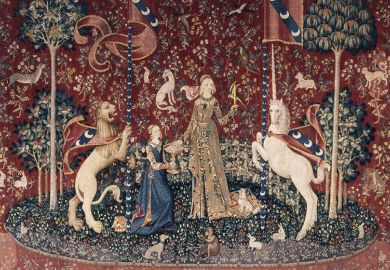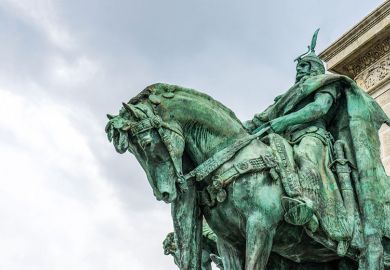“I am a college English instructor. This is a bad time for my species – and a bad time for the study of English. In academe, we are witnessing an extinction of fields of study once thought essential…I don’t know if I am capable of survival in this new environment. Social Darwinists would say it’s adapt or die, but I don’t know how to adapt to a society that doesn’t want what I hold dear.”
These reflections were offered last year by Nina Handler, coordinator of English at Holy Names University in Oakland, California, in an essay in The Chronicle of Higher Education.
Personally, I doubt that the humanities are facing imminent extinction. But I do appreciate Handler’s description of the humanist intellectual as a member of a “species”, rather than, say, as a custodian of timeless wisdom, a creator of knowledge, or a producer of democratic citizens.
Handler, I am sure, would not deny that the humanities do offer their students a kind of wisdom, or that they may contribute to the well-being of society. But I find refreshing her choice to avoid these shopworn self-descriptions in favour of a defiant assertion of the value of the humanities for people like her. For, by describing the humanities in this way, as a source of real but relative value, she wholly circumvents what Simon During, honorary professor of culture and communication at the University of Melbourne, has called the “sermonic” tone that characterises much of the literature in defence of the humanities.
This tone is generated by the insistence that what we in the humanities do is crucial for the health of society as a whole. We might call this the vital-organ defence, as its characteristic gesture is to present the potential demise of the humanities on the model of heart or lung failure – the kind of breakdown that endangers the social body entire.
This familiar rhetorical strategy appears in several variations. Martha Nussbaum, Ernst Freund distinguished service professor of law and ethics at the University of Chicago and arguably the most prominent campaigner on behalf of the liberal arts curriculum, claims that the continuing marginalisation of the humanities in the US and elsewhere “[threatens] the very life of democracy itself”. Anthony Kronman, Sterling professor of law at Yale University, argues in a somewhat Heideggerian fashion that “only the humanities [can counteract the] forgetfulness of humanity” caused by the technological and scientistic culture of modernity.
A more recent case in point is Peter Brooks’ introduction to a collected volume titled The Humanities and Public Life. Brooks, who is Sterling professor emeritus of comparative literature at Yale, opens with the following rallying cry to the profession: “We who practice the interpretative humanities need to be less modest and to stake a claim to the public importance of our task.” That claim, argues Brooks, should hinge on the ethical dimension of close reading – a practice he describes as “[submitting] what we want the text to mean to the constraints of the lexicon, the historical horizon, and the text as a whole”. The more close readers a society has, so runs his argument, the more immune it is to political demagogues, unprincipled advertisers and other sophists.
The particular sophism that Brooks has in mind is the notorious Torture Memos, drafted and signed in 2002 during the Bush administration. As you may recall, these documents sought to provide legal justification for the use of so-called “enhanced interrogation techniques” by the CIA, as part of the US’ War on Terror. To that end, the legal advisers who drafted the memos were obliged to engage in what Brooks describes as “the most twisted, ingenious, perverse, and unethical interpretation” of the US legal code.
Now, being myself a citizen of a country with a sordid history of legitimising torture by all manner of legal shenanigans, I can readily identify with Brooks’ outrage. What caused me to shift uncomfortably in my seat was not his moral indignation but the lesson he draws from this ugly historical episode: namely, that had Bush’s lawyers been schooled in the art of close reading, the US might have been spared the indignity of the Torture Memos. “No one trained in the rigorous analysis of poetry”, he writes, “could possibly engage in such bad-faith interpretation.”
One need not deny that the humanities can produce more sophisticated readers to see how misconceived this is. For one thing, it is unclear what a degree in English or French has over a course of study in, say, sociology or law when it comes to the production of astute readers; for another, the assumption that such readers would refrain from engaging in bad-faith interpretation (or worse) flies in the face of all we know about human behaviour. And lastly, Brooks seems to be implying that we who have been trained in what he calls “the rigorous analysis” of literary texts converge on some agreed-upon method for distinguishing acceptable from bad-faith interpretations. But we have evolved no such method. Nor, I dare say, is any forthcoming.
Let me state my position more bluntly still. I think we are wrong to claim that democracy needs us. It does not – certainly not in anything like the way it needs an independent judiciary or brave watchdog journalists. Moreover, as far as I can tell, there is no special skill called “critical thinking” that only a course of study in medieval history or philosophical metaethics can impart.
Of course, had it been shown that arguments to this effect have been successful in forestalling budget cuts or in generating additional tenure-track positions in our departments then I would be all in favour of using them. But I suspect that the people we are trying to impress with this rhetoric find it as unconvincing as I do. After all, we’ve been reproducing it with considerable regularity for nearly two decades, to little noticeable effect.
To be clear, like Nussbaum, Kronman and Brooks, I too value the humanities. I value the kinds of intellectual work they make possible; the human achievements they preserve, curate and make accessible; and, yes, also the ethical relations – primarily those between teachers and students – that they sponsor. Further, I hold that if these incommensurable goods were to disappear, their loss would not only be ours. The extinction of the humanities would reduce the university to a shell of its former self while affecting society beyond its gates in many foreseeable and unforeseeable ways. We may not be essential to the well-being of humanity or democracy, but that does not mean that our disappearance would leave the world as it was.
Yet I worry that arguments of the form fund-us-or-face-the-apocalyse, however gratifying they may be to our collective self-image, are not only unconvincing but may actually be counterproductive. And so I take issue with Brooks’ recommendation, that we be “less modest” in our claims for the humanities. On the contrary, what may be needed is more modesty. We need to find ways of recommending the Socratic life, without repeating Socrates’ assertion that the unexamined life is not worth living.
To see the humanities in this parochial way, as a cultural tribe or species, is to recognise that a person has to be (at least minimally) one of us before she can be expected to feel the value of the humanities or to view their potential demise as catastrophic. This recognition, in turn, would recommend that we stop trying to convince others of our indispensability, and concentrate instead on trying to draw more students into our world by making our work more visible, relevant and accessible to society at large.
I recognise that all this sounds as if I’m about to present a novel marketing strategy for the humanities. Such a strategy is certainly needed; I think one of the reasons that we keep rehashing the vital-organ defence is that we have not tried to develop an alternative account of the value and distinctiveness of what we do without resorting to hyperbole or self-aggrandisement. But I am more interested here in asking why that void has not already been filled. This is not, I think, an oversight; there are deeper reasons for why we have been reluctant to see ourselves as members of a cultural species or tribe.
Partly, the resistance is pragmatic, and stems from the felt pressures of justification. What we want, after all, is to make the strongest case we can for ourselves, and that aim seems to demand that we appeal to some broadly shared human need that only a vibrant humanities can fulfil. This is what Nussbaum does when she claims that the humanities are crucial because they create “people who are able to see other human beings as full people, with thoughts and feelings of their own that deserve respect and empathy”. The disappearance of the humanities, Nussbaum appears to be saying, would leave the world with a severe deficit of “respect and empathy”.
This is an extraordinary claim, which invites questions about how the human race survived prior to the establishment of the modern research university. But even many who doubt that the humanities play a crucial part in the promotion of liberal tolerance and sympathy may nevertheless insist that self-preservation requires making some such argument. If the humanities do not make us more empathetic, they must make us more resistant to political demagogues; or, if not that, then they must deal in matters of perennial human concern. For to admit that the humanities are a self-contained and self-referential cultural world – not unlike, say, the world of high cuisine – would be to concede that their value is largely internal to the practices and institutions that comprise it. And to concede that would be to fatally compromise our capacity to defend them.
I don’t think this is so. In my view, those who believe that the only ways to protect the humanities are to cite a general utility or invoke the pieties of 19th-century humanism are overestimating the persuasive force of the universalist vocabulary, and underestimating the power of, say, accessible illustrations and demonstrations of what humanist scholarship at its best is like.
Another reason that we humanists have been reluctant, on the whole, to view ourselves as participants in a way of life is that this self-image would offend our mildly narcissistic but wholly necessary individualism. To regard ourselves as members of a tribe or species, with everything that these terms imply, is to suggest that we are more externally determined and less autonomous and self-directing than we perhaps care to admit.
Let me stress that the desire for autonomy to which I am referring here is not a private psychological disposition, but is hard-wired into the institutional world of humanist scholarship. Consider: in contrast with the articles produced by our colleagues in the sciences, the texts that we produce – for which “research” always seems like the wrong word – are rarely co-authored. They also stand in different relation to our social and professional identities. As Foucault pointed out, the “author function” in humanist discourse is much closer to what one finds in the literary sphere than in the scientific world. When reading both literary and humanist discourse we seek out the distinct voice, the characteristic cadences and individual thought-style of an author. We construct a certain personality and locate that personality within a multilayered social, political and historical frame of reference that extends far beyond the specific topic and purview of the study, treatise or narrative we are reading.
This brings ego to the fore much more prominently than in the more sanitised (though no less vicious) preserves of science. Similarly, while scientists can hope to have their names immortalised as an asteroid or pathology, the highest honour for both humanist and literary authors is to become an adjective: to be spoken of as one speaks of a Foucauldian view, a Yeatsian metaphor or a Marxist critique.
The constant one-upmanship and hairsplitting in which all this results have been well satirised by the likes of Kingsley Amis, David Lodge and Don DeLillo. But absurd or not, these features of our intellectual form of life are necessary for keeping the enterprise moving. The constant faultfinding and dissatisfaction with the work of those who came before us, as Yale literary critic Harold Bloom famously argued, are so many attempts at self-assertion and self-creation. The anxiety that drives creative people is the thought of dying in the knowledge that they failed to leave their distinctive mark on the way people see, think or feel – and turned out, ultimately, to be merely “better or worse instances of familiar types”, as the late American philosopher Richard Rorty put it.
If we are uncomfortable with the culturalist view of the humanities, then, it is because it emphasises everything that is contextual, shared and heteronomous about our identities – everything, that is, that we need to repress in order to invent ourselves and our languages anew. It reminds us that even those rare individuals who successfully recreate themselves or make a truly original contribution to the conversation remain no more than variations on familiar cultural types.
Culture, as the American anthropologist Ruth Benedict underscored, is pervasive: “By the time he can talk, [the individual] is the little creature of his culture, and by the time he is grown and able to take part in its activities, its habits are his habits, its beliefs his beliefs, its impossibilities his impossibilities.” Even the most idiosyncratic and rebellious minds – the Virginia Woolfs, Oscar Wildes and Ludwig Wittgensteins of our world – remained, for all their trailblazing originality, unmistakably the children of their time and milieu: even their achievements no more than scratches on massive edifices of cultural uniformity.
There is a paradox hiding in all this: namely that denying our affiliation to the collective cultural formation we call the humanities is necessary for becoming a paradigmatic member of our peculiar tribe. We are like that crowd in Monty Python’s Life of Brian, shouting in unison: “We’re all individuals!”

Let me conclude by touching briefly on one more source of resistance to the culturalist view of the humanities. Put simply: to acknowledge that the humanities are neither a privileged arena of timeless truths nor an organ necessary for the functioning of society is to face up to the contingency, precarity and transience of our private and collective identities. This awareness is one that human beings – intellectuals or otherwise – work hard to repress even when things are going well. But when the prospect of extinction looms large, we often try to actively deny it.
A typical response when a person finds herself consumed by the strangling consciousness of her mortality and vulnerability is to turn to God for comfort. In the intellectual culture of the humanities, the need for metaphysical consolation takes the form of an insistence that, despite everything we’ve come to believe about the historicity of value and the social construction of reality, enduring essences and intrinsic values must somehow be real.
It is thus no coincidence that the current discipline-wide sense of crisis is accompanied by a backlash against the constructivist and historicist paradigm that has dominated the interpretative humanities since the 1980s. This backlash takes several forms: from the various “returns” to ethics, to aesthetics or to formalism, to the surge of interest in the methods and insights of evolutionary psychology and neuroscience. Although couched in different rationales, these disciplinary developments can be seen as part of a single effort to roll back the cultural turn and recoup the objectivist and universalist modes of thought that it sought to retire.
Only time will tell whether Handler is right and the humanities are tipping into extinction. But she is certainly right that it is vain to try to adapt to a society that doesn’t want what we hold dear. As she puts it: “You can adapt only so much before the changes are significant enough that the species itself dies out. The woolly mammoth and the mastodon look a lot like today’s elephants, but they are different things.”
If the humanities are indeed going the way of mammoth, let us at least remain true to our woolly selves.
Nir Evron is a lecturer in the department of English and American studies at Tel Aviv University.
POSTSCRIPT:
Print headline: Humans do not depend on the humanities
Register to continue
Why register?
- Registration is free and only takes a moment
- Once registered, you can read 3 articles a month
- Sign up for our newsletter
Subscribe
Or subscribe for unlimited access to:
- Unlimited access to news, views, insights & reviews
- Digital editions
- Digital access to THE’s university and college rankings analysis
Already registered or a current subscriber?



